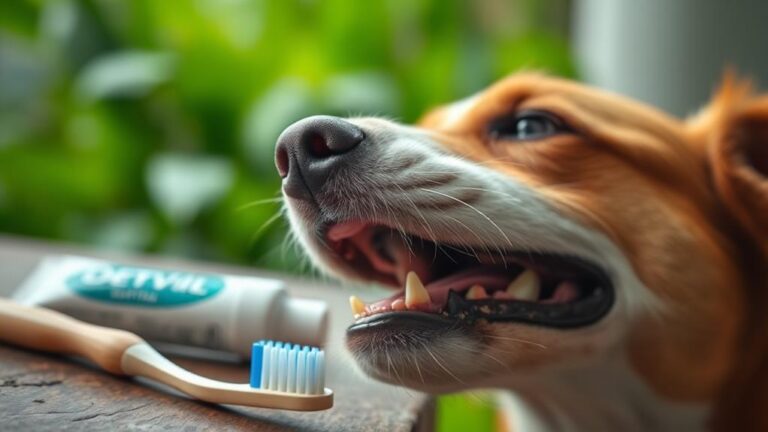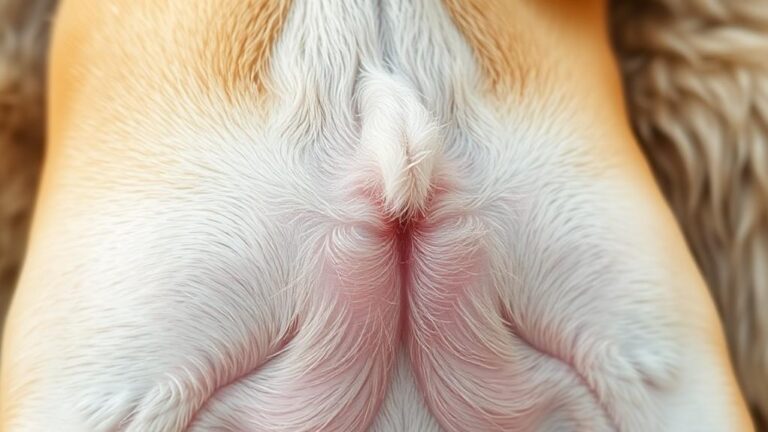To help your dog's rotting teeth, focus on regular dental care.
First, take your dog to the vet for check-ups and cleanings. These visits can stop serious problems like gum disease and tooth loss.
At home, make a routine to brush their teeth with toothpaste made for dogs. Give them good kibble and crunchy veggies, like carrots, to help clean their teeth.
Stay away from sugary treats, as they can make decay worse.
Watch for signs like bad breath or heavy panting. These might mean dental issues.
For more tips on dental care, keep looking!
Understanding Tooth Decay in Dogs
Tooth decay in dogs is a big health issue that needs to be taken seriously. It can lead to painful problems if not treated quickly.
Tooth decay usually starts with plaque, which is a sticky film of bacteria that builds up on the teeth. This plaque can cause gum disease and lead to tooth decay over time. When plaque hardens, it becomes tartar, which can create more dental issues. This can result in painful infections that hurt your dog.
Regular trips to the vet for dental check-ups are very important. These visits help keep your dog's mouth healthy. It's also a good idea to check your dog's diet. What they eat can affect their dental health. If gum disease reaches the second stage, it can no longer be reversed and will need professional help.
You can do your part at home, too! Brushing your dog's teeth regularly can help prevent more damage. It's easier to keep your dog's teeth healthy if you start early. This can help avoid problems like tooth loss.
Dental Care for Senior Dogs
As dogs get older, their teeth and gums need extra care. This is important to keep them healthy and avoid serious problems. Regular dental cleanings can help a lot, especially if a vet says the dog's blood work is normal. Tartar buildup can lead to gum disease, which can be painful for your dog. Tartar scraping during cleanings helps keep their mouth healthy. Sometimes, dogs may need sedation for a deep clean.
If your dog has broken or infected teeth, they might need extractions. This means a vet will take out the bad teeth to prevent more pain or infection.
To maintain good dental health, it's best to follow a regular dental care routine. Here are some key things you can do:
| Dental Care Aspect | Importance | Recommended Action |
|---|---|---|
| Regular Check-ups | Helps catch issues early | Schedule vet visits every 6 months |
| Professional Cleanings | Prevents gum disease | Take your dog for cleaning sessions |
| At-Home Care | Keeps plaque in check | Brush your dog's teeth regularly |
Taking these steps can make a big difference in your dog's overall health and happiness. By giving their teeth the attention they need, you can help your furry friend live a longer, healthier life.
Risks of Poor Dental Hygiene
Taking care of your dog's teeth is very important. If you ignore dental hygiene, it can cause serious problems for your pet. When plaque builds up on your dog's teeth, it can lead to gum disease and tooth decay. This hurts your dog, and they may show signs of distress, like excessive panting or shaking. Bad breath is usually the first clue that something is wrong.
If these dental issues are left untreated, they can lead to more severe conditions. Periodontitis is one of them. It can loosen your dog's teeth and even cause them to fall out.
That's not all; infections from dental problems can spread to other parts of the body. This can lead to life-threatening problems affecting vital organs like the heart, liver, and kidneys.
To keep your dog healthy, it's important to take care of their teeth. Regular brushing and professional cleanings can help prevent dental issues. Make it a routine to check their mouth for any problems.
Factors Leading to Tooth Decay
Tooth decay in dogs is a big problem, and one of the main reasons is plaque buildup. Plaque is a sticky layer of bacteria that forms on teeth. If plaque is not cleaned away, it can harden into tartar. Tartar can lead to gum disease, which causes the gums to become red and swollen. This inflammation may even cause the gums to bleed. When the gums are unhealthy, harmful bacteria can enter and affect the teeth.
Diet also plays a role in dental health. Some foods, like onions, are dangerous for dogs. These foods can worsen dental problems, so it's important for pet owners to know what their dogs are eating. Genetics and age can also affect a dog's dental health. Some breeds are more likely to have dental issues than others.
In addition to these factors, accidents can harm a dog's mouth and lead to tooth decay. A dog might injure its mouth while playing or eating.
Lastly, if a dog has a dry mouth, it can't clean its teeth naturally. This can make it easier for plaque and tartar to build up.
To keep your dog's teeth healthy, regular visits to the vet are essential. The vet can help monitor your dog's dental health and catch any problems early. Keeping your dog's teeth clean is important for their overall health.
Nutrition for Dental Health
Good nutrition is very important for keeping your dog's teeth and gums healthy. It should go hand in hand with regular vet visits and good oral care at home. A balanced diet helps stop plaque from building up. Plaque can lead to gum disease, which is not good for your pet.
When deciding how much to feed your dog, remember it affects their overall health, including their dental health. Kibble is a good choice because it can help scrape off some plaque while your dog chews. Just make sure to pick high-quality kibble to get the best results.
Fresh, crunchy vegetables like carrots are great too! They can help clean your dog's teeth naturally. On the other hand, avoid giving your dog sugary treats. Sweets can cause tooth decay, which can hurt your pet.
If your dog has dental problems, you might need to feed them soft foods. But make sure these foods are still healthy and provide all the nutrition your dog needs. Freeze-dried and dehydrated foods are also good choices for their diet.
In the end, feeding your dog a well-rounded diet is key to their dental health and overall well-being. Don't forget to take your dog for regular vet check-ups to catch any dental issues before they become serious!
Conclusion
Maintaining dental health in dogs is essential for their overall well-being. Just as neglected gardens can become overrun with weeds and lose their beauty, poor dental care can lead to serious health issues in dogs. Regular veterinary cleanings, proper nutrition, and at-home dental care can help prevent tooth decay. By taking these steps, pet owners can cultivate a healthy mouth for their dogs, ensuring a happier and healthier life for their furry companions.



